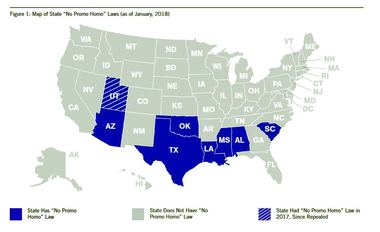Study reveals extreme discrimination toward LGBTQ+ youth

Seven states have laws prohibiting the “Promotion of Homosexuality.” In a research brief released by GLSEN, impacts and implications of laws prohibiting the positive portrayal of homosexuality in schools were examined.
These laws are often referred to as “no promo homo” (NPH) laws because they ban any “promotion of homosexuality.” In Alabama, Arizona, Louisiana, Mississippi, Oklahoma, South Carolina and Texas, educators are barred from portraying LGBT+ people in a positive light. Some go as far as forbidding educators from discussing factual and potentially life-saving LGBT+ health-related information.
Currently, these laws affect approximately nine-million public school students.
“So-called ‘No Promo Homo’ laws have a deeply disturbing and chilling effect,” said Eliza Byard, executive director of GLSEN. “Many teachers in these states do, however, find ways to provide their students an LGBT-inclusive view of the world, despite the pressure.”
National Board Certified Teacher, Claudia Swisher who now works as the Regional Coordinator for Education Leadership Oklahoma, made LGBT-inclusivity in the classroom a priority when she was teaching.
“My classroom had to be a safe place for all my students, but especially my students marginalized by others because they are LGBT+. I remember at least two students talking to me about the fact their parents had rejected them. I told one young man I’d love him and accept him without question until his mom could. And if she couldn’t, I’d never stop loving him.”
Although current laws only explicitly apply to health education, their influence may spill over into other areas of instruction, as well as influence school policies and practices.
Swisher made a point to highlight LGBT+ characters in her classroom. “The last ten years of my career I taught Reading for Pleasure. We read whatever we chose and shared with each other. I found, sometimes through my students, rich literature with strong, positive LGBT+ characters. There is a quote: ‘We read to know we are not alone.’ It was my responsibility to share literature that reflected my students’ realities, and my LGBT+ students deserved to see themselves in books in my classroom.”
The research brief, Laws that Prohibit the “Promotion of Homosexuality”: Impacts and Implications, is an in-depth look at the potential effects of NPH laws across the seven states where these laws are currently in place.
Findings in this new research brief illustrate:
- LGBT+ youth attending school in states with “no promo homo” laws face a more hostile school climate than other LGBT+ students.
- Teachers in “no promo homo” states are less likely to incorporate LGBT+ topics into the curriculum and less likely to engage in other activities supportive of LGBT+ students.
- LGBT+ students from “no promo homo” states are less likely to feel supported by the educators in their schools and are less likely to report attending schools with supportive anti-bullying policies.
- LGBT+ students in “no promo homo” states had less access to student support clubs, such as Gay-Straight Alliances also known as Gender & Sexuality Alliances (GSAs) and had less access to relevant health resources in school.
Additional analyses revealed that even when accounting for differences in demographics, school characteristics, region, state education spending and political attitudes, LGBT+ students in states with “no promo homo” laws were more likely than LGBT+ students in other states to have less access to LGBT+ supportive resources.
GLSEN’s findings suggest that although NPH laws are specific to health education, they have more far-reaching effects. NPH laws are, by design, restrictions on educators who are trying to take common-sense measures to improve the educational experience of LGBT+ students.
People in NPH states can work with their local elected officials to repeal these laws or educate school faculty of the limited scope of NPH laws.
For more information about “no promo homo” laws, national data researched and what you can do to mitigate potential harm, visit www.glsen.org/nopromo.
The Gayly. March 18, 2018. 12:00 p.m. CST.





